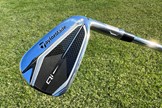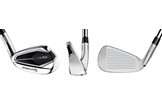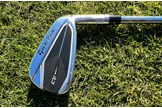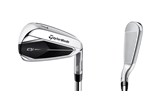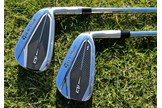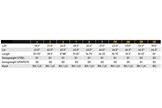Long, straight, and forgiving? TaylorMade Qi Iron Review
Last updated:
-
At a glance
- TG Rating
- Owner Rating
-
Pros
- I love how TaylorMade fitters can let you try this model at weaker or stronger lofts.
- A bulletproof iron that will stand the test of time.
- Forgiving irons don't come much better looking than this.
-
Cons
- An iron that's seriously difficult to fault for its target audience.
What we say...
The TaylorMade Qi iron is a cap-back game improver model promising to deliver straight distance for club golfers. My review finds out if it delivers.
TaylorMade game improvement irons have been one of the brand’s biggest success stories over recent years. So much so that the previous Stealth ranked among the best irons for sales volume several times during its two-year lifespan.
With a decent foothold to grow from the brand hope the new TaylorMade Qi iron, which promises golfers ‘Straight Distance’, will buck the right-sided bias of the majority of game improver irons on the market, here’s how.
Everything you need to know about the TaylorMade Qi iron
The majority of irons contain a right-sided bias
Have you ever noticed how it’s really hard to hit long irons not just well, but straight too? Well, TaylorMade’s lab-coated boffins wondered exactly the same thing and set themselves the task of understanding what was going on. Their investigation revealed how the majority of irons, and game improvement irons in particular, contain a natural built-in bias towards the right side of the golf course (if you’re a right-handed golfer).
The company says it’s an issue that predominantly affects mid and long irons. When shafts get shorter and lofts increase any right-sided bias shrinks to minimal levels. But astonishingly, if you regularly slap mid and long irons down the right side of the golf course, it might well not be all your fault.
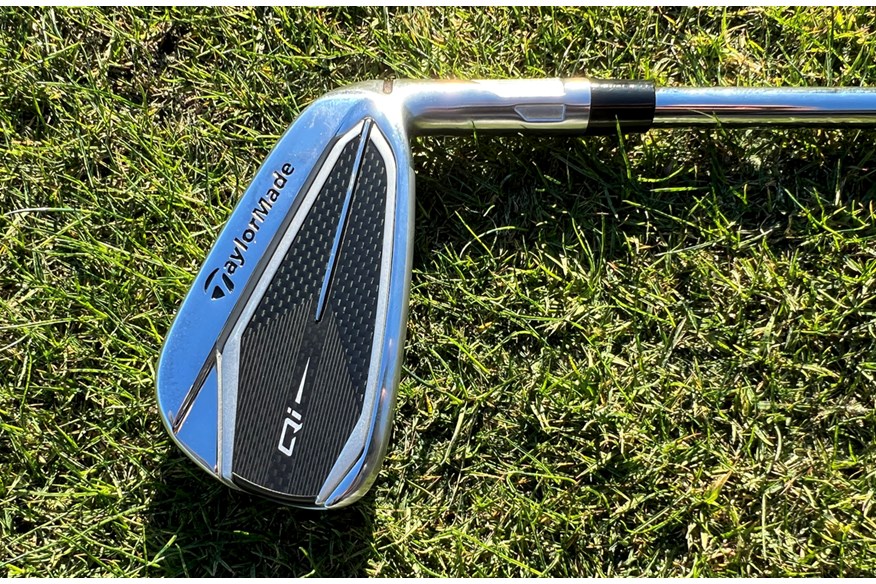
It’s all about the rebound
TaylorMade says their research into the best game improver irons has found the right-sided bias stems from how the face of an iron deflects and rebounds unevenly across its surface. The toe area is bigger and higher than the heel, causing the heel to rebound faster.
This phenomenon imparts cut spin on the golf ball which for plenty of leading 4-irons can mean a right-sided miss of 10 – 20 feet – not great if you happen to make a good swing and decent contact. The new TaylorMade Qi iron cuts that bias to 3 feet.
Ground control to Major Tom
How have they done it? Well, it comes down to controlling face deflection so it’s more uniform across the entire face surface. TaylorMade has developed a new integrated system to manage the uniformity of flex and rebound. It means good strikes go straight and fly far, with almost zero sidespin imparted by the construction of the club. Hence the club’s new ‘Straight Distance’ tagline.
Part of the new control system is a variable face thickness for each iron in the set. Additional mass and thickness are positioned in the toe area of the mid and longer irons to encourage this location to behave like the heel.
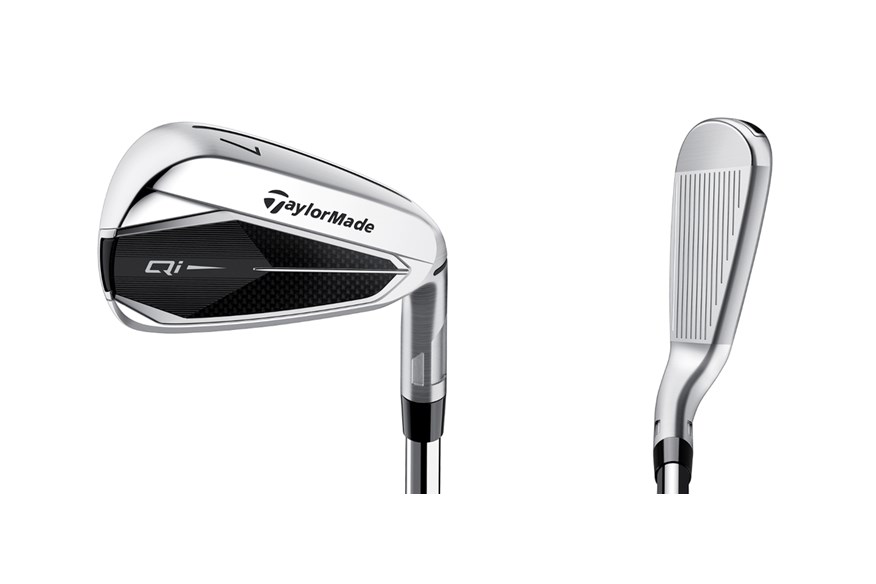
We’re all individuals
TaylorMade has a taste for designing sets of irons as individual entities right now. It’s an idea they employed most recently on the brilliant P790. It sounds simple but in fact, it’s incredibly complex to pull off. Especially so in a cap-back game improvement iron, rather than a hollow body head. The TaylorMade Qi iron has flighted CGs that flow neatly from lower in the long irons to boost launch, through to higher in the short irons which increase control and eliminate ballooned shots.
In their bid to make the Qi the most playable iron on the market in 2024, Taylormade has also incorporated a new variable Speed Pocket design that changes from long to mid irons, maximizing launch and speed from where golfers typically strike the ball. This really is a smart set of completely individual irons designed with a cohesive feel.
Expect a two-year lifespan
Less than 10 years ago TaylorMade had a dubious reputation for introducing new products and superseding them within 6 months with new ‘improved’ models. Things have changed dramatically since then. So much so today the Qi is penciled in for a two-year lifespan, just like the previous Stealth. Hence why the model has been named Qi, and not Qi10 to match the latest family of woods.
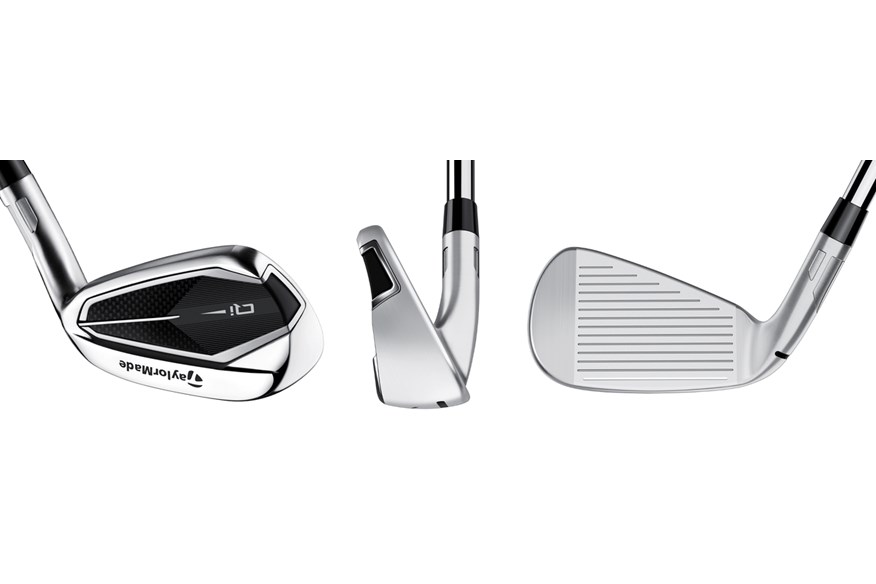
Bonded badges lower ball speed
I asked Matt Bovee, Head of Product Creation for Irons at TaylorMade, why cap back irons are considered ‘better’ for game improvers than traditional cavity back irons. His reasoning highlighted how iron cavity badges impact face deflection, which lowers ball speed and ultimately reduces carry distance.
Hence why recent generations of the brand’s game improver irons have now boasted hollow cap back designs.
Qi iron improvements over Stealth
The monochromatic look of the Stealth iron meant the model was incredibly well received at retail, becoming the brand’s first mass-market iron to stay in the range for two years. The Qi builds on this understated style.
Expect a new chrome plated finish, which TaylorMade doesn’t normally use on game improver irons, more topline width, more hosel offset, 1mm more blade length for improved stability, and a lower leading edge in the long irons (which helps get shots airborne).
Crucially, the sweet spot size has also grown by 13.9% from 145mm2 in the Stealth to 165mm2 in the Qi. All things considered, TaylorMade says the Qi will be 2024’s most accurate game improver iron.
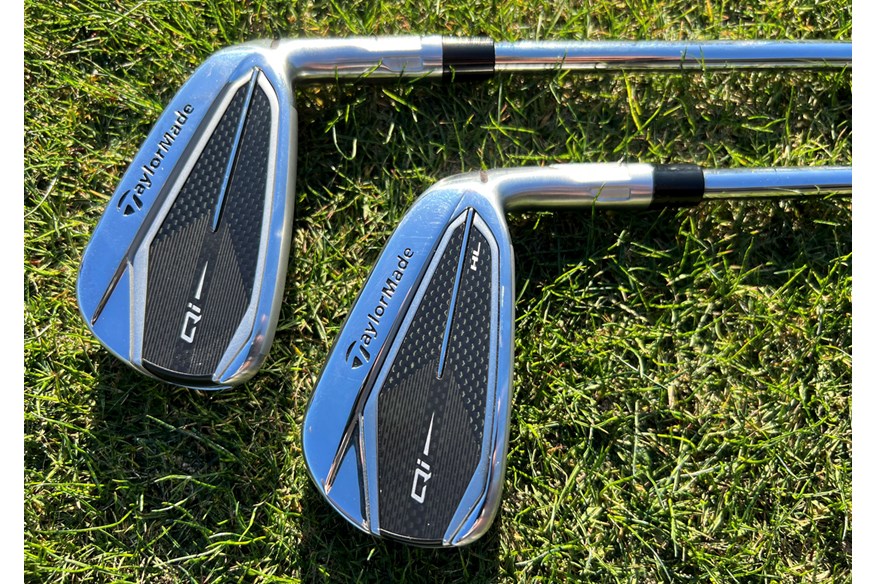
How to choose between the TaylorMade Qi and Qi HL irons
Over the last 18 months High Launch irons have become a massive trend with brands falling over themselves to make higher lofted, lighter, easier launching super game improvement irons. This is at the opposite end of the scale to the super strong lofted ‘distance’ irons that were marketed to less consistent strikers and slower-speed players just five years ago.
Explaining what’s changed, Bovee said: “We understand the consumer better. Slower speed golfers actually hit shots further with weaker lofted irons, the extra spin keeps the ball in the air for longer”.
So if you’re trying to decide if the Qi or Qi HL will better suit your game make sure you consider swing speed.
The company guidance, like the Mizuno JPX923 Hot Metal HL and Ping G430 HL, is 75mph with the 7-iron. This is the mark at which you’ll start hitting weaker loft irons further. The Qi HL is 2° weaker than the Qi in the 7-iron. It also has a 6g lighter head weight and comes up with lighter, higher launch shafts.
Don’t forget any good TaylorMade fitter will also use the brand’s Select Fit hosel system to let you try both models at stronger and weaker lofts to find your optimal set-up.
Video: How does the TaylorMade Qi compare to other leading Mid-Handicap Irons?
Specs: TaylorMade Qi irons
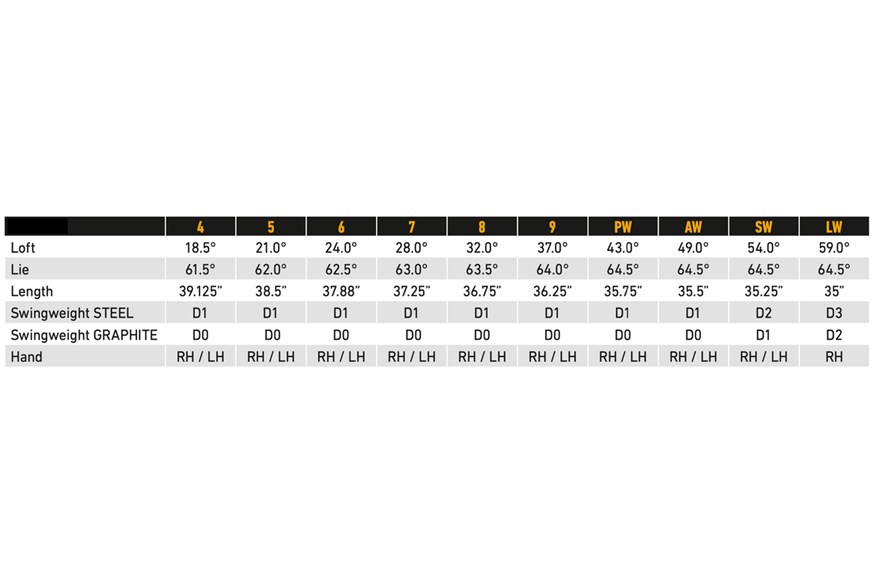
Verdict: TaylorMade Qi Iron
To the untrained eye, the Qi could easily be mistaken for TaylorMade’s previous Stealth iron as the pair are very similar in looks and design. In my eyes, that’s a really positive step forward as TaylorMade evidently no longer feels the need to scrap ideas and attempt to reinvent the wheel after products have sat on the shelf for just a year.
The Qi has a huge amount going for it. The model has a really attractive and desirable head shape and profile, yet it maintains good levels of hosel offset to help flight shots higher for additional carry distance.
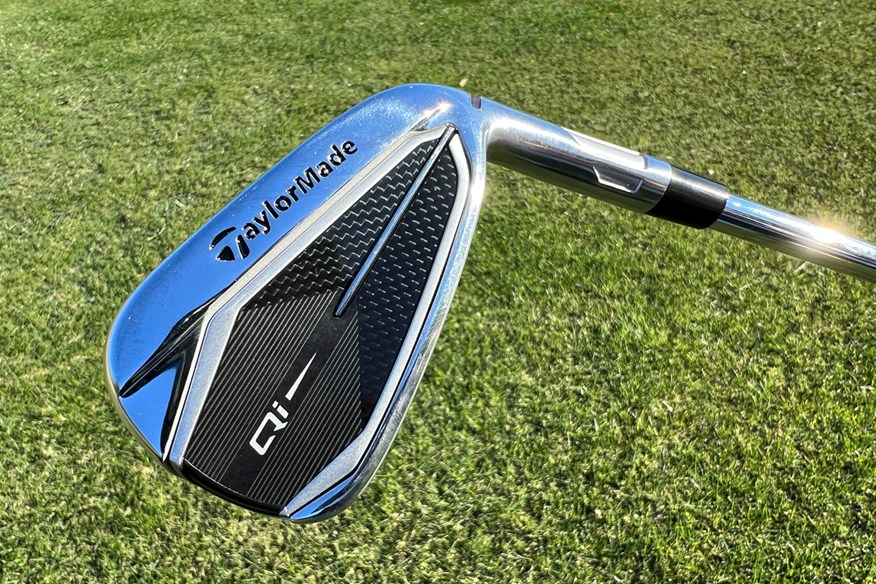
I love the way that thanks to TaylorMade’s SelectFit adjustable hosel system golfers can also try this model at weaker or stronger lofts. The idea allows golfers to see before they buy the effect loft and lie adjustments have on performance and data which means this versatile model is well suited to a vast audience of abilities, speeds, and deliveries. It also means you might well not need to opt for the slightly larger Qi XL to play TaylorMade’s most lofted and easy-to-flight game improvement iron.
As nice as TaylorMade’s ‘Qi = Straight Distance’ tagline is please remember it only really comes into play in the mid and longer irons, as shorter irons don’t have a right-sided bias. If you don’t use long irons the concept could be a bit wasted on you. If you do then the Qi will help hit shots a little straighter and closer to your target as long irons are inherently tough to hit accurately, especially from the turf.
Our test pro’s hitting data below shines a light on how the Qi is a super quick and powerful iron option in 2024. At 198 yards it was tied at the top of the pile as the longest mid-handicap iron we hit this year. The model also posted our 3rd fastest ball speed, especially impressive when you factor in it isn’t the very strongest lofted 7-iron within the category.

Those headline numbers are all well and good, but my eye is drawn to how the model launched and flew higher than our test averages. That performance led to shots hitting the green at a steeper angle which makes the Qi playable in a way traditional strong lofted irons never were a decade ago.
Throw in a dispersion/shot area 2.2% tighter than our test average and it’s not too hard to spot why I feel the model warrants a position among our best-performing Mid-Handicap Irons of 2024. Thanks to TaylorMade’s new two-year product cycle strategy the Qi also won’t feel old hat or out of date until deep into 2025.
Data comparison: How does the TaylorMade Qi compare to leading competitor Mid-Handicap Irons?
| Iron | 7-Iron Loft | Ball Speed | Launch Angle | Backspin | Height | Descent Angle | Carry Distance | Carry Distance Drop Off | Shot Area |
| TaylorMade Qi | 28° | 129.2 MPH (3) | 15.6° | 5065 RPM | 33 YDS | 44.2° | 198 YDS (T1) | 12 YDS | 267.6 SQ YDS |
| PXG 0211 XCOR2 | 28° | 130.1 MPH (2) | 13.6° | 5057 RPM | 29 YDS | 41.8° | 198 YDS (T1) | 16 YDS | 193.6 SQ YDS |
| Callaway Paradym Ai Smoke | 28° | 130.6 MPH (1) | 14.5° | 5311 RPM | 32 YDS | 43.4° | 197 YDS (3) | 18 YDS | 552.6 SQ YDS |
| Wilson Dynapower | 27° | 127.8 MPH | 15° | 4910 RPM | 31 YDS | 42.7° | 195 YDS | 8 YDS (T3) | 196.8 SQ YDS |
| Cobra Forged Tec X | 27° | 127.7 MPH | 13.9° | 4872 RPM | 29 YDS | 42.1° | 191 YDS | 9 YDS | 360 SQ YDS |
| PXG 0311 XP GEN6 | 27° | 126.2 MPH | 13.7° | 4726 RPM | 27 YDS | 40.8° | 190 YDS | 20 YDS | 470 SQ YDS |
| Mizuno JPX923 Hot Metal | 28.5° | 127.6 MPH | 14.9° | 5748 RPM | 31 YDS | 44.2° | 190 YDS | 13 YDS | 243.1 SQ YDS |
| Srixon ZX4 | 28.5° | 126.4 MPH | 14.7° | 5030 RPM | 30 YDS | 43.1° | 189 YDS | 22 YDS | 594 SQ YDS |
| Ram FXT | 126.1 MPH | 15.4° | 5395 RPM | 31 YDS | 43.7° | 189 YDS | 13 YDS | 161.2 SQ YDS | |
| Cleveland XL ZipCore | 29° | 125.1 MPH | 14.6° | 4719 RPM | 29 YDS | 41.8° | 188 YDS | 15 YDS | 210 SQ YDS |
| Ping G430 | 29° | 125.8 MPH | 14.9° | 5117 RPM | 30 YDS | 43.3° | 187 YDS | 7 YDS (2) | 110.6 SQ YDS (2) |
| Inesis 500 | 125.1 MPH | 15.6° | 5456 RPM | 31 YDS | 43.5° | 187 YDS | 8 YDS (T3) | 181.6 SQ YDS | |
| Titleist T350 | 29° | 125.5 MPH | 14.3° | 5159 RPM | 29 YDS | 42.6° | 186 YDS | 11 YDS | 167.2 SQ YDS |
| Cobra Darkspeed | 27° | 126.7 MPH | 12.4° | 5298 RPM | 26 YDS | 40.7° | 186 YDS | 8 YDS (T3) | 129.6 SQ YDS |
| Takomo 101 | 30° | 123.8 MPH | 14° | 4784 RPM | 27 YDS | 40.8° | 184 YDS | 4 YDS (1) | 52.4 SQ YDS (1) |
| Yonex GS i-Tech | 125.2 MPH | 13.8° | 5373 RPM | 28 YDS | 42.2° | 184 YDS | 21 YDS | 611.1 SQ YDS | |
| Vega Mizar Plus | 30° | 125.4 MPH | 14.3° | 5858 RPM | 29 YDS | 43.8° | 182 YDS | 22 YDS | 420.2 SQ YDS |
| Sub 70 699 | 31° | 124.1 MPH | 13.3° | 5847 RPM | 27 YDS | 42.1° | 179 YDS | 11 YDS | 154 SQ YDS |
| MacGregor V-Max | 118.3 MPH | 17.5° | 6305 RPM | 31 YDS | 45.3° | 171 YDS | 8 YDS (T8) | 121.6 SQ YDS (3) | |
| AVERAGE | 126.1 MPH | 14.5° | 5265 RPM | 29.5 YDS | 42.7° | 187.9 YDS | 12.9 YDS | 273.5 SQ YDS |
BECOME A TODAY’S GOLFER MEMBER: Unlimited access to premium content and exclusive rewards!
Product Information
TaylorMade Qi Iron
RRP: £143 (s) £157 (g)
Stock shafts: KBS Max 85 (s) Fujikura Ventus Blue TR (g)
Stock grip: Lamkin Crossline
Category: Game Improver / Mid-Handicap
Forgiveness rating: 3.5/5
Visit the TaylorMade website here


